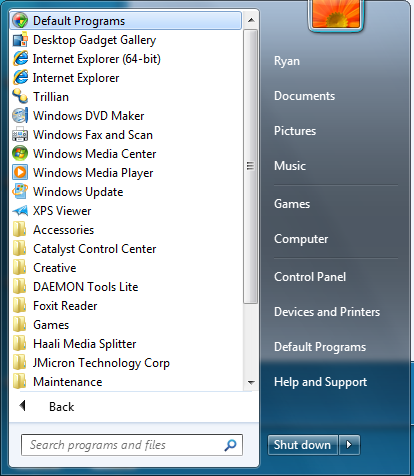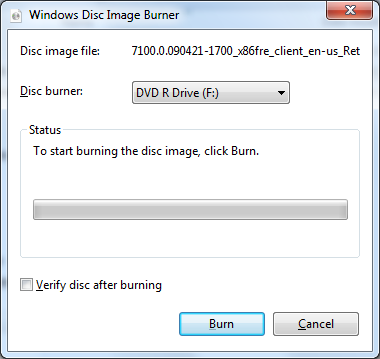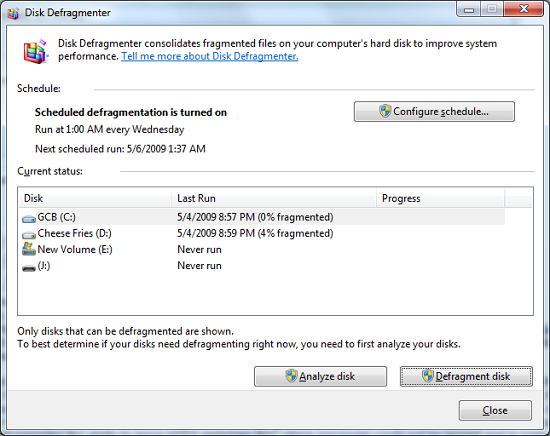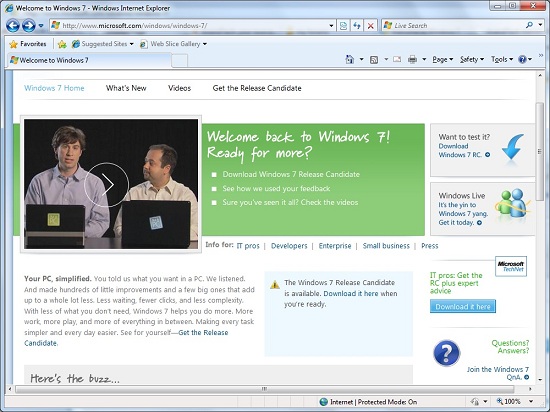Windows 7: Release Candidate 1 Preview
by Ryan Smith and Gary Key on May 5, 2009 11:00 PM EST- Posted in
- Systems
Internet Explorer 8 and the Rest
Rounding out our look at Windows 7’s applications, we have Internet Explorer 8. Recently released for both Vista and XP, IE8 is the latest salvo in the ongoing browser wars between Microsoft, Mozilla, Apple, Google, and Opera. We’re not going to go too in-depth here since it’s not a Windows 7-only feature and we’ll be doing a proper review soon, but as the default Windows browser it’s best to quickly hit on the high points.
Microsoft has taken a lot of well-earned flak for the compatibility of previous versions of Internet Explorer. As far as rendering and adherence to web standards goes, IE has been off in its own little world. Microsoft has finally taken a number of steps to resolve that, making IE behave in a much more standards-compliant manner, even though it breaks sites designed for IE’s previously quirky behavior when those sites don’t explicitly ask for IE to use that behavior (i.e. compatibility mode). It’s still not the most compliant browser out there, but it’s a great deal improved from where it was.
Furthermore the rise of AJAX and other JavaScript-heavy application types has necessitated the need for better JavaScript performance in IE, with IE picking up a garbage collector for JavaScript along with a higher performing JavaScript interpreter. Also new in IE8 is a privacy mode (InPrivate), a new type of search feature Microsoft is calling Accelerators, and separate processes for each tab to keep malfunctioning tabs from bringing down the rest. We’ll have a full work-up of IE8 later this month to look at these features in-depth, so stay tuned.
Meanwhile when it comes time to talk about the rest of the applications, Windows 7 is unusually bare. Microsoft has finally gotten around to following through with their desire to decouple some of the standard Windows applications from the operating system itself, so that they can upgrade the applications separately from the OS. As a result, the following applications are no longer included in Windows as of Windows 7: Mail, Calendar, and Movie Maker.

Missing: Half the applications that should come with the OS
All of them have been spun-off into Microsoft’s Windows Live service (joining previously spun-off Messenger) as part of what Microsoft is calling the Windows Live Essentials pack. While there’s probably a good reason for doing it exactly this way (it’s hard to add features when you’re a convicted monopolist) it’s little consolation to the fact that it makes Windows 7 extremely confusing to use. An operating system without an email client or a calendaring application? What is this, 1995? And what about IE? It’s decoupled from the OS too, and yet it’s still included by default.
At least with Vista and its spun-off Messenger, Microsoft replaced Messenger with a link to the Windows Live website to download it. However with Windows 7 there’s absolutely no indication of where they went unless you start searching the help files. We’ll cut Microsoft some slack here since this is just a Release Candidate, but if this is how they intend to ship the final version (and it probably is) then there is likely to be a number of confused users once Windows 7 launches.

One Windows Live Essential install later, and we have Mail
One notable addition to Windows 7 is that Windows has finally gained some basic ISO disc image handling abilities. Unfortunately it’s not the ability to mount them as a virtual drive like Mac OS X can, but Windows 7 at least gets it half-right by getting the ability to burn them. The new Windows Disc Image Burner fulfills exactly this role, and is invoked by right-clicking on ISO files. It may not sound fancy, but with software increasingly being distributed on ISOs these days (including Windows 7 RC1 itself) it’s undoubtedly handy.

We can't mount them, but at least we can burn them
Last but not least, Disk Defragmenter has received an overhaul in looks and features in coming from Vista. With respect to looks, Microsoft hid the fragmentation status of a hard drive in Vista on the belief that users found it to be superfluous information, and they have restored that information for Windows 7 after receiving negative feedback in order to satiate the power users who wanted that missing information. With respect to features, Microsoft has given Disk Defragmenter the ability to move NTFS metadata files, which previously could not be moved and in some situations unnecessarily blocked the shrinking of partitions as a result. Disk Defragmenter is now also capable of recognizing SSDs, and will block the defragmentation of those disks since defragmenting is of no use due to wear-leveling algorithms.

The new Disk Defragmenter











121 Comments
View All Comments
thebeastie - Wednesday, May 6, 2009 - link
I guess what would be the most naive is to think that Windows 7 is about anything else but money, I mean they could easily improve Vista to have every feature that Windows 7 has, but they wont.MS has handed out whole new versions of DirectX and just about every other type of similar feature that is in Windows 7 so forth via service packs in the past.
Some how come that is not possible these days? Its just about treating us like complete fools.
B3an - Friday, May 8, 2009 - link
...You do know you're talking to yourself thebeastie??Are you really this stupid or is apple paying you to write this?
SkateNY - Wednesday, May 6, 2009 - link
Microsoft is a company in decline. It's top managers, supporters, fanboys, and investors are all in denial about this.Their most recent OS was and remains an abysmal failure. Their attempt at competing in the MP3 market is a disaster, no matter how many people tell us that they love their Zune. Their "loss leader" in game consoles is just that...a leader in losses.
Want proof? Look at the stock price for the past five years...at least five years.
MSFT investors are desperate. They'll say and do anything to make others believe that the company is doing as well now as they were doing before they were adjudicated by the US Department of Justice as violating the Sherman Anti-trust Law in restraint of trade.
They've lost a great deal of their investments over the past ten years. They're so desperate that they need to tell themselves -- and anyone who will listen -- that this is a great company.
Sorry, but as is true in the rest of the real world, what has Microsoft done for anyone invested in them lately? The soft answer would be "nothing." The truth is that they've damaged their investors through bad judgment, poor management, and malfeasance.
What they've done is move a great deal of their previously loyal customers to Apple and Linux. And a large percentage of them who haven't made that move are looking into it.
It's a sad story. With so many resources, the best they could do was barely maintain their core products...Windows and Office. Not enough. The rest of the tech world is passing them by, and they don't seem to have a clue.
piroroadkill - Thursday, May 7, 2009 - link
Huh?Microsoft aren't going anywhere.
SimpleLance - Wednesday, May 6, 2009 - link
"It's a sad story. With so many resources, the best they could do was barely maintain their core products...Windows and Office. Not enough. The rest of the tech world is passing them by, and they don't seem to have a clue."Who in the tech world is passing them by? Linux? There is nothing in the Linux world that is an innovation. Everything is a just a bad copying of what they see in Windows. Same goes for OSX. Name a technology from Linux or OSX, and you will find that in Windows years ago.
In the mean time, there is a lot of Windows features that neither OSX or Linux has.
BitLocker drive encryption - OSX only has folder encryption. Windows has had that since Windows NT 3.x.
Active Directory - now being copied by Linux
Access Control List - only recently added in OSX. Has been in Windows NT 1.0.
Remote Desktop - no equivalent at all in Linux or OSX. All they have is VNC. VNC started in the Windows world that got implemented in Linux and OSX. That is the worst form of remote desktop (screen scraping). Its like a high school student's home work. With Remote Desktop, Windows users threw away VNC as trash, and Linux/OSX picked it up - they really have nothing else, but junk.
SMB - copied as Samba. Where is AppleTalk now? Apple does not know how to write an OS. They had to take BSD.
DirectX - makes Open GL like a kid's work.
Etc. etc.
Who again is overtaking who?
New in Win7...
BITS Branch Cache (Vista had something called Peer Cache) - serverless P2P.
Support for TRIM command for SSD - now perhaps being added to Linux. Another me too effort. Definitely not in OSX.
Improved (less chatty) SMB - Samba is behind again. Nobody in the Linux world could make a better SMB. MS had to do it.
VHD Booting - Linux folks probably scratching their head now. What is that? they say. How do we copy that?
Plus all the other eye candy that people talk about.
Hgr - Friday, May 29, 2009 - link
"In the mean time, there is a lot of Windows features that neither OSX or Linux has."I am sure of that, but of those you are listing here, many simply do not apply.
"BitLocker drive encryption - OSX only has folder encryption. Windows has had that since Windows NT 3.x."
BitLocker is a trademark of Microsoft, so it will be difficult to find it in non-Microsoft operating systems. If you're looking for drive encryption in Linux, distributions have been supporting this for years.
"Active Directory - now being copied by Linux"
Yes, the Samba folks are quite active in reimplementing AD in Samba 4 - as a means of Windows interoperability. Note that DNS, LDAP and Kerberos, the three most important of the protocols that AD is built upon, have been copied by Microsoft from Unix systems. They have been available for Linux de facto from their inception.
"Remote Desktop - no equivalent at all in Linux or OSX. All they have is VNC. VNC started in the Windows world that got implemented in Linux and OSX. That is the worst form of remote desktop (screen scraping). Its like a high school student's home work. With Remote Desktop, Windows users threw away VNC as trash, and Linux/OSX picked it up - they really have nothing else, but junk."
Just because you don't know better solutions does not mean that there are none. VNC certainly isn't a native Linux remote desktop protocol, much less a universal tool for everyday work (it has not been designed to be one). For years, X11 SSH tunnelling has been available. For those who want a low-latency remote desktop, the NX compression protocol and software suite have been available for quite some time, and many are perfectly happy with it. Linux's NX can compress even Windows RDP even further. ;-)
"DirectX - makes Open GL like a kid's work."
Just because DirectX is good for making games does not make OpenGL "a kid's work". After all, DirectX is more akin to SDL than to OpenGL. OpenGL has clearly a different target audience - it is used to build industrial software. Is it surprising that it's different?
"SMB - copied as Samba. Where is AppleTalk now? Apple does not know how to write an OS. They had to take BSD."
Actually, SMB was not invented "at Microsoft". It is an intellectual child of three companies - IBM, Microsoft, and 3com. Many operating systems have later adopted this protocol. Surprising, again? We want to be able to talk to other systems so we adopt it. In Linux, you can use at least half a dozen networked file systems.
"Improved (less chatty) SMB - Samba is behind again. Nobody in the Linux world could make a better SMB. MS had to do it."
Why hasn't it been less chatty before? :-) Well, of course, Samba is behind, Microsoft is in charge of updating their broken protocols, the Samba team is not going to do this for them. A Linux user simply uses a less chatty (less broken?) protocol.
"Support for TRIM command for SSD - now perhaps being added to Linux. Another me too effort. Definitely not in OSX. "
Linux kernel and its file system modules have been ready for this since half a year ago, according to one of the leading Linux file system developers. And it is no "me too effort", not as long as it is not Microsoft that invented it a started manufacturing the devices. Are you trying to imply that for any hardware feature, there is only one OS allowed to support it without being accused of me-too-ism, and that all other systems that include support later are just copycats? Great, I've mentioned Kerberos. Good to see that MS joined the "I want it too" crowd. :-)
andrihb - Wednesday, May 6, 2009 - link
In your dreams, maybe.strikeback03 - Wednesday, May 6, 2009 - link
Unfortunately, there are plenty of applications that don't run natively in any *nix (Adobe is my problem) so some version of Windows is the only option.coolkev99 - Wednesday, May 6, 2009 - link
I don't buy an OS based on company stock price.C'DaleRider - Wednesday, May 6, 2009 - link
[quote]Look at the stock price for the past five years...at least five years.[/quote]OK...I did....and the stock price 5 years ago was in the $24/share range, as it was 4 years ago, 3 years ago, 2 years ago, last year. In fact, it's been around $24 per share going back almost 10 years ago.....although just after the beginning of 2000 it spiked to $48 per share, but then the dot com bubble burst and every tech stock fell, MS's included. The release of XP did give a bump to roughly $34/share, but again fell back to its "base" of around $24/share.
Sorry, but this is the first fact you are sadly misinformed on.
Then, the investors. Don't think most are crying and desperate at all. MSFT has been paying dividends every quarter, like clockwork. Granted, since Vista's release, it's not been spectacular, but has been fairly consistent.
Consider MSFT's 5 yr. net profit margin, 27.9%, is still well above sector and industry average. The company's low price-to-earnings ratio -- which Oakmark Fund places at less than nine, based on estimates for this year's earnings -- is closer to seven if you exclude the $4 a share in net cash.
Nicely, the stock is also currently sporting a dividend yield of 3%. But one problem is that investors, especially individual investors, put too much focus on growth expectations and too little focus on price.
Here's another tidbit you overlooked in your bashing.....MS had an EPS of $1.87 in '08, its highest EPS pay since '99. And MS's net profit has grown from '04-'08, every year. (FYI...net profits were, from '04-'08: $8.1B, $12.2B, $12.6B, $14B, and $17.6B).
Granted '09 will be "dismal," it's been dismal for everyone. But MS will still show a net profit and is paying nice dividends on its stock.
And as for everyone crying and gnashing teeth about MS, I wonder why Barron's, and every other analyist, puts Microsoft as a strong buy and NOT ONE has MS as a sell of any sort.
And game consoles? MS never planned to turn a profit on each...it IS a loss leader, just like the PS3. The games themselves are the profit center. Always has been like that and probably will always be like that.
So, where's the panic? Where's the problem? MS is still sitting on over $640M in cash reserves.....something a lot of companies can only wish to have.